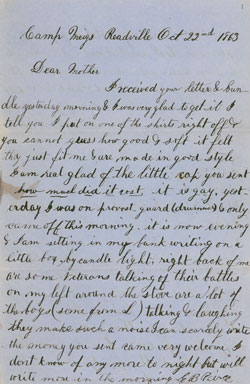Collections Online
Letter from Edward Burgess Peirce to Mary Alden Peirce, 22 October to 24 October 1863
To order an image, navigate to the full
display and click "request this image"
on the blue toolbar.
-
Choose an alternate description of this item written for these projects:
- Main description
[ This description is from the project: Civil War ]
In a three-page letter written in late October 1863, young Edward Peirce of Lowell, Massachusetts, reassures his mother that he is safe, comfortable, and eager for more news from home, as he awaits his muster into active service. Peirce offers a vivid picture of his daily life at Camp Meigs, the busiest of Massachusetts’ military camps, located in Readville, in the Hyde Park neighborhood of Boston.
Edward Burgess Peirce was born on 27 May 1847 to John and Mary Peirce of Lowell. He was just sixteen years old when he enlisted in the 2nd Regiment Massachusetts Volunteer Heavy Artillery in July 1863. [Please see the online presentation of a locket containing a tintype of Peirce taken circa 1863.] According to family legend, Peirce had sought to enlist twice previously, but his parents would not consent. Ultimately, Peirce and his fifteen-year-old friend and fellow Lowell resident Joseph Noyes enlisted, serving the regiment as drummers, but by May of 1864, Peirce writes to his father that he has “left off drumming and taken a musket.” He served the remainder of his time with the regiment as a private, mustering out of service in early September 1865.
Recruitment of the Massachusetts 2nd Artillery was slow, and Peirce and other recruits remained in camp at Readville for several months before mustering into service and departing for Newbern, North Carolina, in November 1863. As a result, Peirce is still close enough to home that care packages can be sent rather easily, with some even being hand delivered by Lowell residents doing business in the city. In this letter Peirce thanks his mother for the clean shirts and cap she has sent, stating, “last night … I was rather cold except my feet and head which were kept warm by the slippers & cap you sent” (page 2). Just a couple of weeks before, Peirce had written home to his mother, “it is so cold now that I think that if you have got any shoes or night – cap made you had better send them to me if you get a chance.” This pattern of requesting items and sending a heartfelt thank you when the items arrived continues during the twenty months he spent on the front.
Throughout his service, the letters Peirce sends home reflect the cares and concerns of the child soldier. In addition to requesting items needed to make him feel more comfortable in his various assignments, he often discusses feelings of homesickness, fears that he is not performing as well as the other drummers, and his own struggles with the question of whether to re-enlist if the war does not end before his term of service expires. He also frequently apologizes for his poor writing, offering various excuses for the quality of his handwriting, and reassures his mother that he is sleeping well, being adequately fed, feeling healthy, and staying safely within the protection of the various forts his regiment was assigned to.
After the close of the war, Peirce returned to Lowell, where he married Ella A. Folsom on 23 November 1870. Together they had three children, Charles (who died from croup as baby), John, and Florence. Later in life, Peirce served as a claims agent and assistant in the legal department of the New York and New England Railroad. Edward Peirce died on 25 June 1919.
Sources for Further Readings:
The featured item is one of 42 letters in the Edward Burgess Peirce Letters. The letters, written between July 1863 and August 1865, are addressed to Burgess’s parents and report on camp life, a yellow fever epidemic, and the end of the war, including comments on the death of Abraham Lincoln. The collection also includes a sketch by Peirce of Fort Totten, where he was stationed in late 1863, and a history of the Peirce family.
“A Soldier’s Story: Edward Burgess Peirce.” MHS Miscellany, number 80. Boston: Massachusetts Historical Society, 2002.

